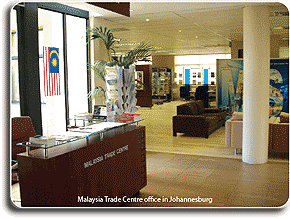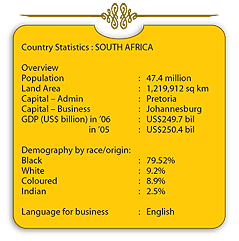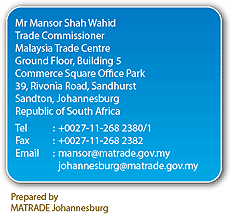Feature on MATRADE: Trade Commissioner In South Africa
 The Country That Offers Opportunities
The Country That Offers Opportunities
South Africa is the economic powerhouse of Africa, with a gross domestic product (GDP) four times that of its Southern African neighbours and comprising around 25% of the entire continent’s GDP. The country leads the continent in industrial output (40% of total output) and mineral production (45%) and generates most of Africa’s electricity (over 50%).
Its major strengths include its physical and economic infrastructure, natural mineral and metal resources, a growing manufacturing sector, and strong growth potential in the tourism, higher value-added manufacturing and service industries.
South African banking regulations rank with the best in the world. The sector has long been rated among the top 10 globally. There are 55 locally controlled banks, 12 foreign-controlled banks and five mutual banks. Some of the world’s leading institutions such as Barclays and Industrial & Commercial Bank of China (ICBC) have entered the local banking sector through mergers and acquisitions.
The JSE Limited is the 18th largest exchange in the world by market capitalisation. The JSE’s rules and their enforcement are based on global best practices, while the JSE’s automated trading, settlement, transfer and registration systems are the equal of any in the world.
Four main metropolitan areas dominate economic activity within the country: Johannesburg and its surrounds (Gauteng province), the coastal Durban/Pinetown areas (KwaZulu-Natal), the Cape Peninsula (which includes Cape Town), and the Eastern Cape’s Port Elizabeth/Uitenhage area. The financial and industrial sectors are concentrated in Gauteng province, which on its own account for over 30% of the country’s GDP.
 The government’s aim of pursuing economic growth is more than just the growth itself. It provides people with work opportunities, higher incomes to buy or build homes, acquire furniture, contribute towards their children’s education, consume water and electricity and generally improve their quality of life. The economy is undergoing its longest expansion on record, and in recent years has experienced elevated growth in an environment of rapid credit expansion, booming asset prices, strengthening public finances, and rising international reserves financed by large capital inflows.
The government’s aim of pursuing economic growth is more than just the growth itself. It provides people with work opportunities, higher incomes to buy or build homes, acquire furniture, contribute towards their children’s education, consume water and electricity and generally improve their quality of life. The economy is undergoing its longest expansion on record, and in recent years has experienced elevated growth in an environment of rapid credit expansion, booming asset prices, strengthening public finances, and rising international reserves financed by large capital inflows.
South Africa’s economy has been in an upward phase of the business cycle since September 1999 – the longest period of economic expansion in the country’s recorded history. During this upswing – from September 1999, the annual economic growth rate averaged 3.5%. In the decade leading to 1994, economic growth averaged less than 1% a year. Following the 5% real GDP growth experienced in 2006, the International Monetary Fund projected growth for 2007 is 4.8% followed by 4.5% real GDP growth in 2008.
 How Malaysian Companies Can Benefit From South Africa
How Malaysian Companies Can Benefit From South Africa
South Africa has a very young population with more than 30% of the population under the age of 14 years. 10% comprises teenagers, 18% aged between 20 and 30, whilst only 5% of the population is older than 65. Suppliers of products and services targeting the young economically active populations are likely to benefit from this. This would include not only basic goods, such as food and clothes, but also luxuries like television sets, radios, cellular telephones and motor vehicles.
However, the largest proportion of the South African population is still the economically disadvantaged black population with very high birth rates. This portion of the market, about 65% of the total population of 0 – 10 year olds, will have limited resources for manufactured and expensive baby goods. They consume only basic foodstuffs, and have one or two sets of clothes and homemade toys. However, contrary to their basic lifestyles, parents ensure good medical treatment for their children due to free medical treatment in state hospitals.
Malaysian companies need to be aware of the following:
 Government procurement under Black Economic Empowerment (BEE) – Malaysian companies who are interested to participate in Government Procurement tenders must comply with the BEE requirements which give preference to local companies and local products. The solution is to participate through joint venture with local partners. Malaysian companies need to identify the right and eligible partners as well as the correct processes for joint venture agreements.
Government procurement under Black Economic Empowerment (BEE) – Malaysian companies who are interested to participate in Government Procurement tenders must comply with the BEE requirements which give preference to local companies and local products. The solution is to participate through joint venture with local partners. Malaysian companies need to identify the right and eligible partners as well as the correct processes for joint venture agreements.
South Africa has the finest infrastructure on the African continent: a well-maintained and ever increasing road and rail system with links to the entire subcontinent and the busiest airport in Africa, and one of the busiest in the southern hemisphere. The country is marching forward as an African and world leader into the millennium, armed with excellence.
